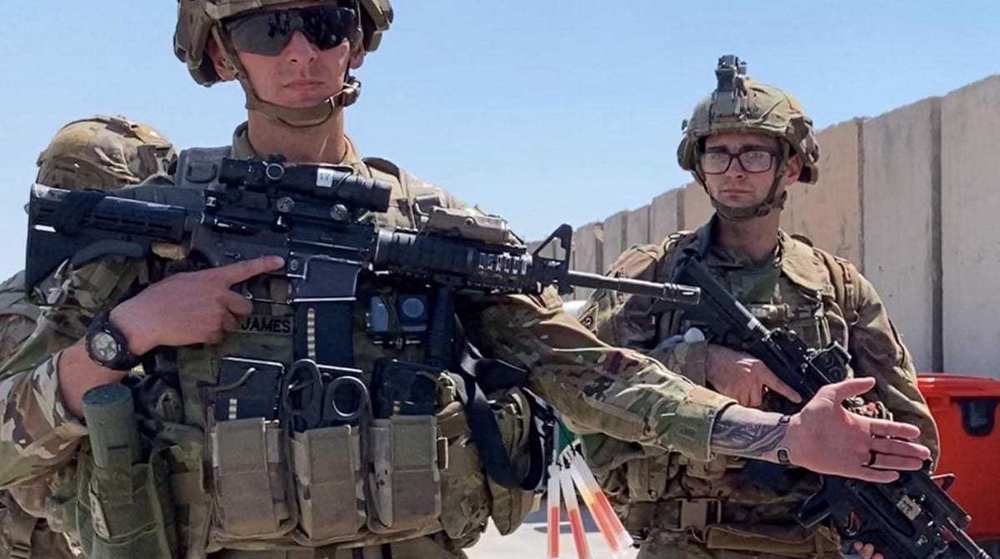US not serious about Iraq pullout, talks useless without timetable: Expert
An expert warns that the US is trying to neuter the latest round of talks on potential withdrawal of its combat forces from Iraq, citing the history of Washington's refusal to commit to previous such negotiations.
"The Americans are trying to kill time and circumvent the Iraqi parliament's law mandating their troops' withdrawal," Iraqi security expert Sabah al-Akili told Press TV on Saturday.
He reminded that the United States had been holding on-again-off-again negotiations with Iraq towards the supposed pullout since 2008.
The talks have been allegedly focusing on a 21-article roadmap planning out the withdrawal, but Washington has avoided committing to most of the provisions of the plan, Akili noted.
The United States had reportedly taken all of its combat forces out of Iraq under former president Barrack Obama. The same American commander-in-chief, however, flooded the country with military forces as part of a Washington-led coalition again in 2014 under the pretext of battling the Takfiri terrorist group of Daesh.
The terror outfit had emerged amid the chaos and sectarian violence that had resulted from the 2003-then US-led military intervention.
Obama’s successor Donald Trump took down the number of the forces to 2,500 by January 15. Many, however, downplayed the drawdown as a gesture aimed at boosting his re-election chances that Trump would very likely reverse if he was chosen president again.
On Wednesday, it was reported that a third round of withdrawal talks had resulted in an agreement on reassignment of the Iraq-based American forces to elsewhere across the world, with Washington only keeping a so-called training mission on the country's soil.
The announcement came after constant pressure from many Iraqi factions, influential personalities, and the general public on the country to follow up a law passed by parliament early last year that had ordered withdrawal of all US-led forces.
The law was approved after a US drone strike targeted Baghdad, assassinating senior Iranian and Iraqi anti-terror commanders, Lieutenant General Qassem Soleimani and Abu Mahdi al-Muhandis, and their companions.
General Soleimani, the region’s most revered counter-terrorism official, was martyred while he was on an official visit to the Iraqi capital.
Aside from the parliamentary law, the strike was followed by millions-strong funeral processions and marches throughout Iraq in protest against Washington’s aggressive presence and intervention in the Arab country.
Akili said, "The US has left the Iraqis' side in all demanding and tough circumstances," and warned that Washington was seeking to "abuse" its strategic cooperation framework with Baghdad this time around too.
He cautioned that the latest withdrawal talks had been followed by "contradictory" remarks on the part of the Iraqi negotiating team. He also said a Washington-friendly official, whom he did not name, had also put a hazy spin on the whole matter, saying the American combat forces would dwindle in number, but the remaining forces would be assigned to "assisting" Baghdad.
The expert regretted that there were no "exact figures" about the current number of American troops, who are deployed in Iraq or their equipment, their operations, and the level of control over the Iraqi airspace.
The Americans, he said, were exercising full control over a number of bases in western and northern Iraq, including Ain al-Assad and al-Harir base in the Kurdistan Region, and do not allow Iraqi authorities into the outposts so they can find out what was going on there.
This reflected a violation of Iraq's sovereignty and Washington's ignorance towards the country's government, the pundit bemoaned.
US' ulterior motive
By prolonging its military presence in the Arab country, the US tries to safeguard its own interests, revive Daesh, and further its regional strategic goals that include providing the Israeli regime with protection and confronting the regional resistance front, Akili said.
Staying in Iraq would enable the US to weaken the regional countries so it can advance its pro-Israeli agendas, including the so-called "deal of the century," a hugely pro-Tel Aviv plot hatched by Washington, the analyst stated.
The Americans, he added, were trying to impose their will on the Iraqi people, using certain figures and political factions, who favor continued US military interference, towards the purpose.
He advised that the withdrawal talks had to come up with a timetable outlining the manner of the troops' withdrawal, otherwise they were "worthless," and also urged that the Iraqi parliament speaker pitch in the efforts that could help enact the law mandating the forces' pullout.
The government, too, has to act on the parliamentary legislation, otherwise various political factions can take action to impeach or overturn it, Akili said.
Nevertheless, the expert expressed certainty that Iraqis' will was "stronger than that of the occupier" and that the US would eventually turn Iraq into its "own graveyard."
The American forces would not try to engage with Iraqi resistance groups directly, but the groups have Coordination Council that has vowed they "would take action if the Americans' insisted on staying."
So far, he noted, Americans have been being warned against continuing their military presence in Iraq by means of various attacks that have taken place on their convoys, but such attacks could expand in scale to target their bases if necessary.
The United Nations ratifications entitle Iraqis to confront those occupying their homeland, Akili said, and underlined that the Iraqi groups were equipped with advanced weapons as well as surveillance and reconnaissance devices.
VIDEO | Yemen; a bone in Israeli neck
D-8’s role in Iran’s economy after Cairo summit
China slams US as ‘war-addicted’ threat to global security
China ‘firmly opposes’ US military aid to Taiwan
VIDEO | Press TV's News Headlines
President Yoon Suk Yeol to be removed from office
At least 19 Gazans killed by Israeli airstrikes since dawn: Medics
Leader: Iran neither has nor needs proxy forces










 This makes it easy to access the Press TV website
This makes it easy to access the Press TV website